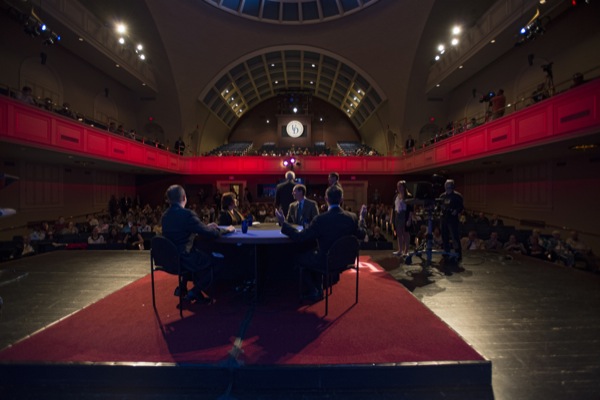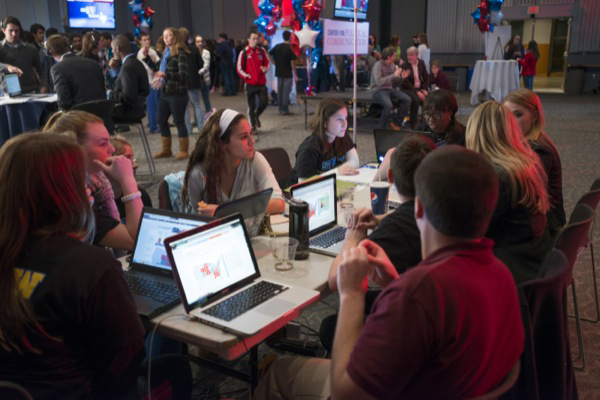Election year politics
Numerous classes, events give students an inside look at political campaigns
11:37 a.m., May 9, 2016--As University of Delaware students follow the 2016 election campaigns this summer and fall, many of them as first-time voters, they will have a large number and wide variety of courses, activities and events available to provide an inside look at the political process.
Opportunities include the “National Agenda: Road to the Presidency” speaker series in which students can help host and interact with the nationally known presenters, an evening of debates by Delaware’s congressional and gubernatorial candidates and courses covering such topics as election law, LGBT politics, politics and the media, and politics and entertainment. The speaker series and debates are also free and open to the public.
Campus Stories
From graduates, faculty
Doctoral hooding
“We get a lot of interest from students who have always followed politics and might be majoring in subjects like political science or public policy, but part of my goal is also to reach out to students who might not have been that involved in politics before,” said Lindsay Hoffman, who is director of National Agenda, associate professor of communication and of political science and associate director of UD’s Center for Political Communication.
The events and courses, she said, can be seen as “a kind of basic citizenship education for any student who wants to follow this year’s elections and better understand the process.”
National Agenda 2016: Road to the Presidency
Last year’s National Agenda film and speaker series focused on issues of race in America, and Hoffman said she wanted to continue some of that theme in this year’s program, although the timing of the fall 2016 series makes it more strictly political.
“But race is an important issue on this campus, and I think it will be an important issue in the election,” she said. With that in mind, she has scheduled the Oct. 5 National Agenda speaker to be D. Watkins, author of The Beast Side: Living (and Dying) While Black in America.
Other speakers in the series, which will be held on six Wednesday evenings from Sept. 7 to Nov. 16 in Mitchell Hall, include UD alumnus Domenico Montanero, lead political editor, and Sam Sanders, political reporter, both with NPR.
The series will also feature a talk by Ashley Black, a writer for the political satire show Full Frontal with Samantha Bee and a post-election analysis by UD alumnus David Plouffe, a political strategist who managed Barack Obama’s 2008 presidential campaign.
In addition to being a public speaker series, National Agenda is also an academic course, and students who are enrolled have the chance to host the speakers during their visits to campus, interact informally with them and help organize each session, learning some of the behind-the-scenes operations involved in staging a political event.
Students in previous classes have called the experience transformative, Hoffman said.
“It’s just an amazing experience for them to get to spend time with the speakers and ask them questions off the record,” she said. “And this year will be especially fun because they’ll also help with the debates.”
Debates and Election Central
The Oct. 19 session of National Agenda will feature the 2016 Delaware Debates, two consecutive events that evening.
Major candidates for Delaware’s lone seat in the U.S. House of Representatives will face off in one meeting, and the candidates for governor will also debate. Students help plan the debates and host the candidates, and many of the questions that Hoffman asks as moderator will be those suggested by students.
On Election Day itself, Nov. 8, all interested UD students will be able to gather in the Multipurpose Room of Trabant University Center for Election Central, a place to follow the returns and celebrate.
Courses in politics and communication
Numerous courses offered in the fall will have particular relevance during an election year.
In the political science class Voting and Elections, Philip Edward Jones, associate professor of political science and international relations, hopes to give students a view of campaigns they don’t get from general media coverage.
“We go beyond what pundits say to explore what really drives voter decision-making and election outcomes with hard evidence,” he said. “The findings often surprise students — for example, most voters’ decisions are highly predictable, and most campaigns have little effect on who wins — but lead to a better understanding of how American democracy works.”
The Election Law class taught by Wayne Batchis, associate professor of political science and international relations, will cover a number of issues that affect this year’s election, from new voter ID laws and the 2013 U.S. Supreme Court decision that declared part of the Voting Rights Act to be unconstitutional to decisions about campaign financing.
“My First Amendment Class also touches on many issues relevant to the 2016 contest,” Batchis said. “Donald Trump, for example, has made a point of criticizing the press, and expressed a desire to make it easier to hold journalists responsible for articles he sees as defamatory. His willingness to do this, however, might very well come into conflict with the First Amendment of the U.S. Constitution and its protection of free speech and press.”
Other election-related political science courses offered during fall semester are Introduction to American Politics, Introduction to Global Politics and Contemporary Political Ideologies.
Communication courses include Communication Principles in Advertising, Politics and Entertainment, Media Effects, and Communication and Persuasion.
Courses combining political science and communication, in addition to the National Agenda, are a Political Communication Lecture Series and Politics and the Media.
Article by Ann Manser
Photos by Evan Krape












